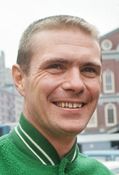 Tommy Heinsohn was inducted into the National Basketball Association Hall of Fame twice, first as a player and then again as a coach. He spent 60 years with the Boston Celtics, as a player from 1956 to 1965, their coach from 1969 to 1978, and more than 30 years as a broadcaster of their games. He was involved in all 17 of the Boston Celtics’ National Basketball Championships and 21 appearances in the NBA Finals. He stopped playing due to a foot injury after nine seasons, and was just as successful as a coach.
Tommy Heinsohn was inducted into the National Basketball Association Hall of Fame twice, first as a player and then again as a coach. He spent 60 years with the Boston Celtics, as a player from 1956 to 1965, their coach from 1969 to 1978, and more than 30 years as a broadcaster of their games. He was involved in all 17 of the Boston Celtics’ National Basketball Championships and 21 appearances in the NBA Finals. He stopped playing due to a foot injury after nine seasons, and was just as successful as a coach.
Unfortunately, after a young life of superb fitness and strength, he lapsed into a lifestyle that destroyed his health. He began smoking heavily when he was a player and eventually suffered from serious lung damage. He followed a horrific meat-and-sugar diet and drank alcohol to excess, gained a huge amount of weight and became diabetic. He died at age 86 from kidney failure caused by his long-time diabetes.
A Lifetime in Basketball
Heinsohn was born in Jersey City, New Jersey in 1934. He was one of the top high school players in the country at St. Michael’s High School in Union City and won a full scholarship to play basketball at Holy Cross College, where he became their all-time leading scorer with 1,789 points and averaged 22.1 points per game. In his senior year, he averaged 27.4 points and 21.1 rebounds per game.
In 1956, his first season as a Boston Celtic, he helped Boston win the NBA championship by scoring 37 points and pulling down 23 rebounds in the double overtime seventh game of the NBA Finals. That year he was named the NBA Rookie of the Year, over teammate Bill Russell. From 1956 to 1965, he helped the Celtics win eight NBA titles in nine years, and played with some of the best basketball players of all time: Bill Russell, John Havlicek, Sam Jones, Bob Cousy, Bill Sharman, Don Nelson, Ed McCauley, Tom Sanders, Frank Ramsey, K.C. Jones, and Larry Sigfried.
In 1966, he retired because of a foot injury. He worked in broadcasting from 1966 to 1969, and became the Celtics’ head coach in 1969. He was the NBA coach of the year in 1973 and the winner of NBA championships in 1974 and 1976. He resumed broadcasting after he finished coaching and continued to do so until 2015. His later years as a broadcaster were hampered by multiple health issues, and in his final years he was limited to studio commentary because he was unable to travel to games. He was hospitalized for clotting in July 2020, and died from kidney failure on November 9, 2020.
His Coach Told Him to Smoke
During his career in the 1950s and 1960s, Heinsohn and many of the other Boston Celtics players smoked. This was the period when television ads featured doctors in their white coats talking about the health benefits of cigarettes. Heinsohn’s coach, Red Auerbach, had become concerned about Heinsohn getting very tired on the court and told him to stop smoking. Heinsohn stopped smoking and started to gain a lot of weight, so Auerbach told him to start smoking again. In his later years he suffered from COPD (Chronic Obstructive Pulmonary Disease), from the lung damage caused by his decades of smoking.
Great Athletes Often Gain Weight When They Retire
The scientific literature has firmly established that exercise helps to prolong your life by reducing your chances of developing obesity, diabetes, clotting diseases such as most heart attacks and strokes, and kidney damage. However, I also know that after a professional athlete stops exercising and gains weight, he or she is no less likely to suffer diabetes or a heart attack than people who never exercised. I have told the stories of dozens of superior athletes who gained huge amounts of weight after they stopped competing but continued to eat the diet they used while they were in training: lots of red meat, fried foods, and sugar-added foods and drinks.
The habits that star athletes acquire while they are playing become extremely harmful later in life. When players leave their professional sports, they should continue to exercise, change their diet and avoid gaining weight for the rest of their lives.
More that 70 percent of North Americans will develop diabetes and be at high risk for heart attacks, strokes and kidney disease. Even if you were never a great athlete, you can markedly decrease your chances of suffering a premature death by following the rules of an anti-inflammatory lifestyle.
Thomas William Heinsohn
August 26, 1934 – November 9, 2020


